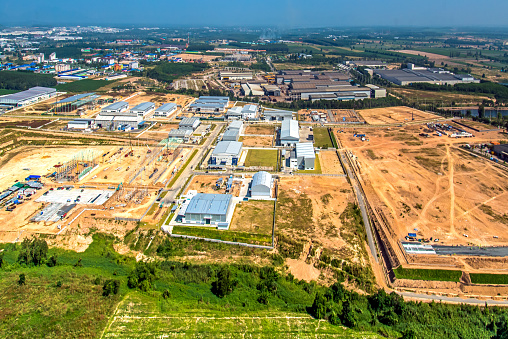 Let’s explore land development strategies for getting the best result with the least pain. Rest easy… I’m not writing this to persuade you all to retain my firm for your design, engineering, and land development needs (though I wouldn’t mind, and my contact information is provided)! But since I’ve been around the block long enough to see even savvy business people get hurt by the convoluted, unpredictable, costly, and sometimes unfair world of land development, I feel compelled to share my experience and offer some advice to help others avoid the pitfalls and heartache of such a process.
Let’s explore land development strategies for getting the best result with the least pain. Rest easy… I’m not writing this to persuade you all to retain my firm for your design, engineering, and land development needs (though I wouldn’t mind, and my contact information is provided)! But since I’ve been around the block long enough to see even savvy business people get hurt by the convoluted, unpredictable, costly, and sometimes unfair world of land development, I feel compelled to share my experience and offer some advice to help others avoid the pitfalls and heartache of such a process.
Download Printable Article (PDF) >>>
Despite the perception that land developers are all super-wealthy and greedy, I’ve seen development projects get caught-up in litigation for years, at an expense of millions of dollars, for deals that marginally make financial sense, yet provide a needed service, housing, or economic development opportunities for the community. I’ve seen deals that die (and orphaned properties languish in the process), because a developer was denied access to certain incentives that might render a project feasible, all because he/she is perceived to have “deep pockets”.
But more impactful to me as a professional, I’ve seen many that do not have the experience, knowledge, and expertise in land development strategies get themselves in substantial trouble by either not conducting the proper due-diligence, overpaying on property because of ignorance of value, or listening to poor advice. These are not the big developers that we all know and love (or hate), but the small business owner that is fortunate enough to expand a business and now needs to add to his/her facility or even open at a different location. This could also be the franchisee who wishes to operate a retail or restaurant establishment that knows their business well, but is understandably clueless when purchasing and entitling property, and/or seeking capital.
It’s certainly true that no two deals, properties, or situations are ever the same in real estate, but I’ve enumerated several general things to consider when deciding whether or not to “take the plunge”, and also things to be aware of once the “go” decision has been made.
Many of these are more specific to smaller deals and the “non-developer”, but many are also attributable to the larger owner/investor/developer as well:
Land Development Strategies #1.
Understand your true needs… You’ll need to take stock in what you and your organization or operation truly need in terms of space, acreage, accessibility, geography, exposure, proximity to skilled workforce and other resources, etc. Attention must also be paid to future expansion plans based on growth strategies. Only after this is clarified to yourself can it be made clear to your broker, consultant, investors, capital resources, etc. If developing property for investment purposes, your goals are already likely in place…maximize property and get the best possible returns! Read on, as many of the following will resonate for you as well.
Land Development Strategies #2.
Seek assistance as you source property for your program… This one’s easy, as everyone reading this already knows who is the best broker and real estate advisor in the Delaware Valley. Still, there’s no reason not to ask others you trust on issues such as market conditions and trends, property values, likelihood of success to secure entitlements, local government intelligence, etc. Additionally, make certain that the site meets your physical criteria, such as ingress, egress, circulation, parking, loading, building location and orientation on site, and the ability to promote your brand and/or operation.
Land Development Strategies #3.
Understand the challenges and constraints of a property you’re sourcing… There are numerous things to consider under this heading. First, you must know the property’s zoning designation, and how to interpret it’s meaning relative to permitted uses, density, height, number of stories, parking requirements, etc. These things are not only public policy and matters of law, but also make sense for you… Who wants to build a new manufacturing facility next to a group of single-family homes, a high rise commercial building near a horse farm, or build homes next to a nuclear power plant? Beyond zoning, you must also be aware of the local political climate and fervor, and assure that any “Not-In-My-Backyard (NIMBY)” issues are innocuous and easy to deal with. Quite frankly, I’ve found that if a municipality clearly doesn’t want your development or project, even if the zoning is appropriate, sometimes it’s better to not even start down that path and select another location.
Land Development Strategies #4.
Assess, Manage, and Mitigate Risk… When developing property or expanding a facility or operation, you must pay attention to the following general risk categories:
a.) Environmental Risk
b.) Market Risk
c.) Entitlement Risk
d.) Finance Risk
e.) Construction Risk
All of these can be daunting to the real estate neophyte, and downright dangerous if proper due-diligence isn’t undertaken. However, with the proper consultants, these risks can be understood, identified, quantified, and mitigation strategies can be implemented. Make sure these risks are understood before “hard money” deposits are released to Seller, as the costs associated with these risks are commonly grounds for negotiating purchase price.
Land Development Strategies #5.
Understand property’s value, and DON’T OVERPAY! There are a few methods to determine the fair price that you should be paying for property (sale or lease), but don’t be pressured to accept a price that doesn’t work for you. Chances are that if a price doesn’t pencil-out as you evaluate a deal, it won’t work for other interested parties either. Many times, a rejected offer comes back, and you might find yourself back in driver’s seat a month or two later, and at your number.
Land Development Strategies #6.
Understand all documents you execute… Many savvy business owners, operators, and land developers can review documentation for “business terms”, but I recommend also having your attorney review for “legal terms”. This can include Purchase and Sale Agreements, Option Agreements, Partnership/Operating Agreements, Financial Agreements, Leases, Developer Agreements, etc.
Land Development Strategies #7.
Understand available programs and grants that may apply… If developing property, there may be property tax incentives and other programs to help the deal’s proforma, which can make an otherwise lean deal become more sensible. There are several other grants and programs available for those looking to simply expand their business, based on your positive impact on the community and job creation/retention. The flip side to this is just as important… if not vigilant, a town may impose unfair fees on your project, such as impact fees, off-site infrastructure improvement costs, and funds for affordable housing and others. Again, make sure you’re aware of these, and have your attorney review any documents that memorialize any negotiated impact costs.
Land Development Strategies #8.
Hire the best team of consultants possible… There are numerous strategies to accomplish this goal, and some may have better results than others on a deal-by-deal basis. For instance, many say to retain a local and “connected” land-use attorney to advance the project through Zoning and Site Plan Approval process. I agree in some cases but not others. If your project requires these types of land entitlements, it is imperative that you retain consultants that not only have experience in their specific disciplines, but their expertise must be specific to your project, your program, and with the types of entitlements required. These consultants consist of the land-use attorney, architect, civil engineer, professional planner, landscape architect, traffic/transportation consultant, environmental scientist, wetlands specialist, real estate valuation expert, market research specialist, and others based on specific needs of the deal. It’s also imperative to have a single “quarterback” run the process. For more experienced and savvy developers, this is usually someone in-house (or the principal him/herself). Sometimes it’s the attorney, and sometimes it appears that NOBODY is truly steering the ship.
These considerations are generic in nature, but I’d be delighted to elaborate on these and other deal-specific strategies to assist getting your project or development deal to the finish line. Best of luck to you all on your future growth, expansion or development plans.
 Alan S. Brandies
Alan S. Brandies
VP Client Relations and Business Development
Jarmel Kizel Architects and Engineers
42 Okner Parkway, Livingston, NJ
(O) 973-994-9669
(C) 732-966-5273
abrandies@jkarch.com
Jarmel Kizel Architects and Engineers is a full service and uniquely diversified consulting firm, specializing in architecture, planning, interior design, structural engineering, civil/site planning, and MEPF services, serving building owners, developers, facilities mangers, and end-users. We are active in many sectors, mostly focused on multi-family residential, child daycare centers, corporate interiors, health and wellness, and others. We also possess decades of land-use and development experience, and offer full “Development Advisory Services”, including deal facilitation and entitlement management. Please visit our website for more information, and call Alan Brandies for more details.


